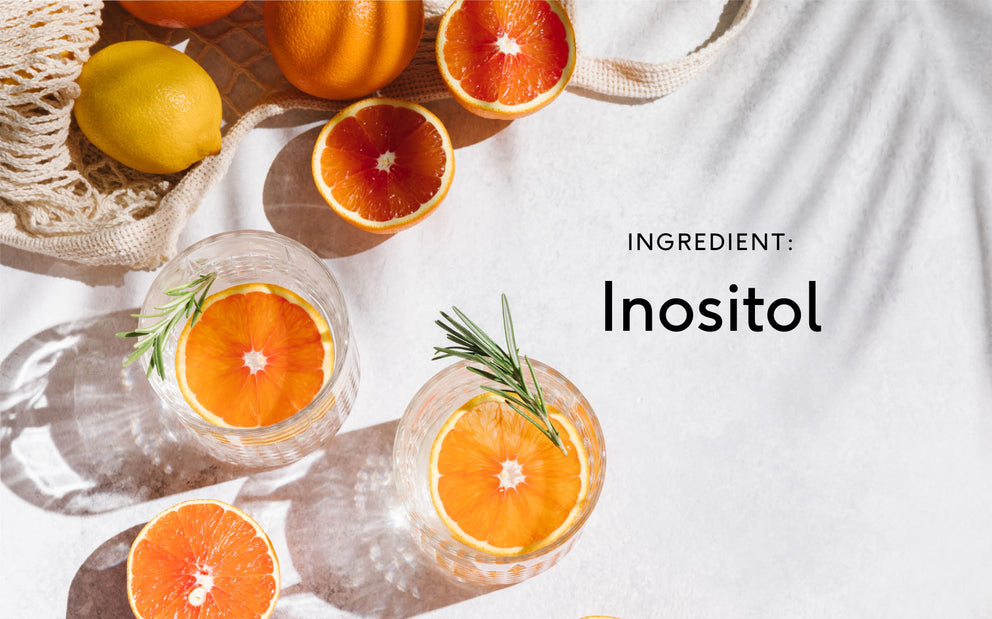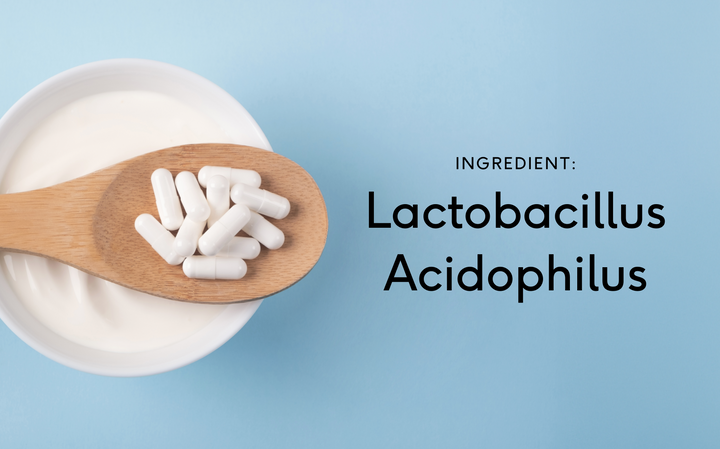Learn About Inositol in 5 Minutes
Table of contents

What is myo-inositol?
Inositol, also known as myo-inositol or vitamin B8, is a lesser-known member of the vitamin B complex. This carbohydrate is a type of sugar alcohol, and it is used to help your cells respond to various transmitters such as growth factors, hormones, and neurotransmitters. Your kidneys naturally synthesise inositol from glucose, but studies suggest that taking additional inositol in the form of a dietary supplement may provide further benefits. Specifically, supplementary inositol may help with mood, diabetes, and fertility.
Is inositol water-soluble or fat-soluble?
Like other B vitamins, myo-inositol is highly soluble in water, so it has high bioavailability and absorbs into your tissues rapidly.
Where can inositol be found naturally? Common sources of inositol:
- Cantaloupe: This melon is considered to be one of the richest natural sources of inositol.
- Citrus fruits: Myo-inositol is also found in smaller concentrations in citrus fruits such as oranges, grapefruit, and lemons.
- Beans and grain: Foods that contain dietary fibre are also reasonably high in inositol.
What is the recommended daily value for inositol?
No major regulatory agencies have assessed the dietary benefits of inositol, so there is no nutrient reference value (NRV) for this substance. Research indicates, however, that inositol may be beneficial in concentrations as high as 18g per day.
Can you absorb enough myo-inositol from food?
Aside from cantaloupe, most foods that contain inositol only include this beneficial nutrient in extremely small quantities. Therefore, it’s most convenient to get the additional inositol your body needs from supplements.
Why is inositol necessary for your body?
Your body uses both endogenous (body-generated) and exogenous (supplemental) inositol to facilitate proper interactions between your cells and various transmitters that move throughout your body. Within your cell membranes, inositol generates special molecules that help your cells become more responsive to important signals that prevent disease and promote proper tissue health. Science has determined that this B vitamin may help specifically with mood disorders, fertility, and blood sugar regulation.
Functions of inositol
- Potential mood and neurological benefits: Research indicates that inositol may naturally improve levels of serotonin in your brain, which could have a wide variety of beneficial effects. For instance, inositol’s potential serotonin-boosting effects may improve anxiety, prevent panic attacks, and help with depression.
- Potential fertility benefits: Polycystic ovary syndrome (PCOS) is a female reproductive condition that can reduce the production of oestrogen, interfere with menstruation, and cause other serious issues in reproductive-age women. Research indicates that inositol may stimulate ovulation in women with PCOS and reduce other symptoms of this fertility-inhibiting condition.
- Potential diabetes benefits: Research shows that your cells may use inositol to process insulin, and clinical studies indicate that inositol may improve insulin sensitivity in patients with diabetes. This natural vitamin may also help prevent gestational diabetes, which is a temporary form of diabetes that can occur during pregnancy.
Supplementing with Inositol alongside folic acid during pregnancy is thought to reduce the risk of gestational diabetes, which is why both these nutrients are included in Feel Pregnancy.
When should you take inositol?
Inositol supplementation is rapidly being recognised as a potential mainline treatment for women with PCOS. This condition is traditionally resistant to treatment, but recent research indicates that supplementing with myo-inositol may promote ovary health without causing any serious side effects. Since this vitamin also appears to mitigate depression, anxiety, and panic disorders while helping your body process sugars effectively, inositol appears to be an excellent supplement to add to your toolkit whether you want to improve your fertility or simply add to your overall health and well-being.
We’ve included 30mg of Inositol in Feel Meal Replacement, perfect for helping to balance your blood sugar levels.
How long do you need to take inositol to start experiencing its benefits?
Since inositol is a water-soluble nutrient, this vitamin will start exerting its effects quickly and with high bioavailability. Your body needs time to adapt to increased vitamin levels, however, so it may be necessary to use inositol repeatedly over the course of 7-10 days to start noticing results.
How long does it take for your body to digest/absorb inositol?
As a water-soluble substance, inositol should fully absorb into your body’s tissues within 24-48 hours.
How long does inositol stay in your body after you take it?
Once it is broken down into molecules that help your cells process signals, the component parts of inositol may stay in your cells until they divide or die.
Is myo-inositol an antioxidant?
Limited research indicates that inositol may directly prevent oxidative damage in human tissues. Even if this nutrient is not a direct antioxidant, it appears to at least exert indirect antioxidant properties.
Can you overdose on inositol? What are the effects?
There is no information suggesting that it’s possible to overdose on inositol. At concentrations exceeding 12 grams per day, however, this nutrient may cause mild side effects like insomnia and digestive discomfort. When used in reasonable concentrations, inositol does not appear to have any negative effects.
Does inositol dissolve, flush out, or build up in the body?
After ingestion, inositol rapidly dissolves into your tissues, where it is used to make molecules in your cells that help with proper hormone, growth factor, and neurotransmitter signalling.
Can you take inositol during a diet?
By improving your body’s ability to regulate blood sugar, using inositol may improve your metabolism and help you lose weight. Since this substance is gluten-free, non-GMO, and not derived from animals, using inositol does not interfere with any common dietary restrictions.
Are there synthetic forms of inositol?
Most types of inositol on the market are produced using synthetic or semi-synthetic processes.
Absorption rate of synthetic inositol
Synthetic forms of inositol appear to have similar bioavailability to natural forms of this vitamin.
Why might natural forms of inositol be better?
Since synthetic inositol is made without using any harmful chemicals, there is no reason to believe that natural forms of this substance are superior.
How to take inositol
Inositol is generally consumed in foods that are high in this substance or in the form of inositol supplements.
Myo-inositol trends in medicine
In 2020, a lab study showed that inositol may protect against heavy metal toxicity in the thyroid, which is believed to be one of the major potential causes of thyroid disorder. Also this year, scientists explored the potential benefits of inositol in preventing the cytokine storms that are commonly associated with COVID-19. In this Italian review of the potential evidence, researchers concluded that inositol may reduce some of the most severe symptoms associated with this deadly virus.
Sources
1. Effect of Inositol on Bulimia Nervosa and Binge Eating
2. Double-blind, Controlled, Crossover Trial of Inositol Versus Fluvoxamine for the Treatment of Panic Disorder
3. Double-blind, Controlled Trial of Inositol Treatment of Depression
4. Pretreatment With Myo-Inositol in Non Polycystic Ovary Syndrome Patients Undergoing Multiple Follicular Stimulation for IVF: A Pilot Study
5. Myo-inositol in Patients With Polycystic Ovary Syndrome: A Novel Method for Ovulation Induction
6. Effects of Myo-Inositol Supplementation in Postmenopausal Women With Metabolic Syndrome: A Perspective, Randomized, Placebo-Controlled Study
7. The Effect of Myoinositol Supplementation on Insulin Resistance in Patients With Gestational Diabetes
8. Protective Effects of Myo-Inositol and Selenium on Cadmium-Induced Thyroid Toxicity in Mice
9. Inositol and pulmonary function. Could myo-inositol treatment downregulate inflammation and cytokine release syndrome in SARS-CoV-2.













































 Back
Back





